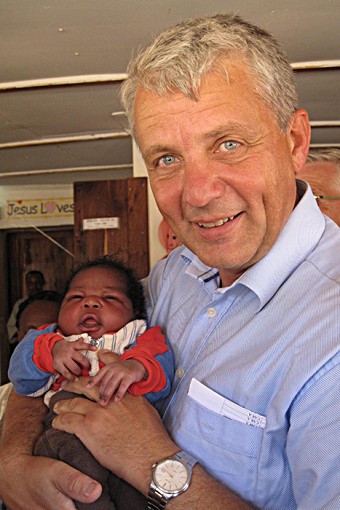Every woman, every child in Manyara, Tanzania

Dagfinn Høybråten
Board Chair of the GAVI Alliance
2011
 While world leaders recently gathered at the United Nations in New York to discuss how to reach every woman and every child with lifesaving health care, mothers and their children gathered at a remote health post in Tanzania’s Manyara region to receive vaccinations, prenatal care and anti-retroviral therapy against HIV/AIDS.
While world leaders recently gathered at the United Nations in New York to discuss how to reach every woman and every child with lifesaving health care, mothers and their children gathered at a remote health post in Tanzania’s Manyara region to receive vaccinations, prenatal care and anti-retroviral therapy against HIV/AIDS.
This is just one of the approximately 30 of such health posts in the region that is served by the Haydom Lutheran Hospital located about 300 kilometers from Arusha in northern Tanzania. Every month a dedicated band of health workers travel over bumpy roads and in single engine planes to reach far-flung communities with life-saving assistance. While leaders were discussing how to reach” the hard to reach,” these health workers were on the ground actually doing just that.
The hospital, which was originally set up by a Norwegian civil society organisation and is now run by a local church group, was all a bustle on the sunny afternoon of my arrival. There, as at the health post, large groups of mothers with their children were lining up for registration, vaccination, check-ups and medication, some shading their babies from the hot sun and swatting away the ever-present flies.
Maternal and child health is a priority for Tanzania. And mothers are responding. Since 2008, vaccine coverage has gradually improved. Routine immunisation for babies has increased from 83% in 2007 to 91% in 2010. And the government has plans to soon provide new life-saving vaccines against rotavirus and pneumococcal, the two main causes of severe diarrhoea and pneumonia, respectively.
I spoke to one of the pregnant women waiting in the registration line. She is expecting her second child. And thanks to a free ambulance service, she will be able to give birth at the clinic under the supervision of a trained midwife. In-hospital deliveries have doubled over the last three years due to these free services. Last year there were more than 5,000 deliveries at this hospital and only six maternal deaths – much lower than in years past.
Three days prior to my visit, a young mother died on her way to the hospital. She had not used the ambulance service. Back at the hospital, I held her baby in my arms – he managed to survive. Strong and lively, he will be taken care of in a special ward for a few months until his extended family is able to take care of him.
Here in Manyara, as in other areas of sub-Saharan Africa, the critical role of civil society organisations is evident, and the efforts of local health workers are making a difference in the lives of every woman and child – every day.
This blog post is also featured on the Bill & Melinda Gates Foundation website.
